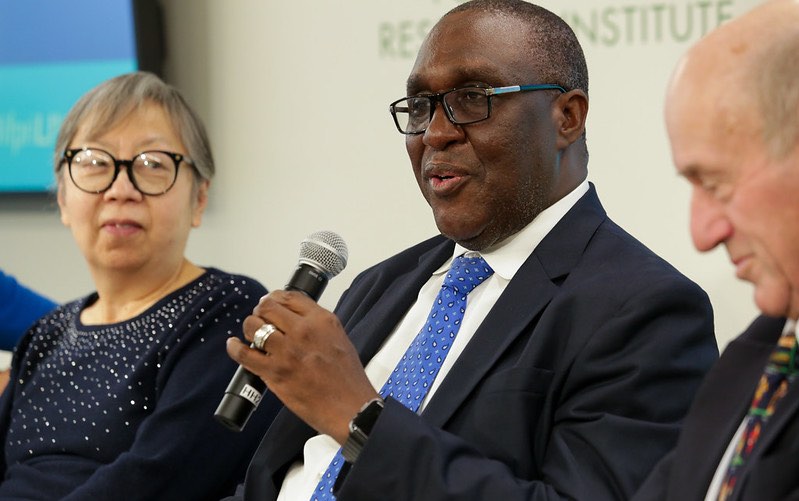Over the past 30 years, Ghana has experienced steady growth in per capita income and rapid urbanization, giving it a reputation as an African success story. But despite these changes, the country has not industrialized, leaving many Ghanaians still working in the low-productivity agricultural and services sectors. A new IFPRI book—Ghana’s Economic and Agricultural Transformation: Past Performance and Future Prospects—analyzes the evolution of the country’s economy and calls for leveraging agriculture to transform it.
The book’s editors—Xinshen Diao and Danielle Resnick of IFPRI, independent consultant Peter Hazell, and development strategist Shashidhara Kolavalli—discussed its major findings and their relevance for policymakers and practitioners, and for Ghana’s future, in an Oct. 9 launch event moderated by Hazell. The event was co-organized by IFPRI and the CGIAR Research Program on Policies, Institutions, and Markets (PIM).
Diao, deputy director of IFPRI’s Development Strategy and Governance Division, noted some of the reasons Ghana’s economy has lagged. “We found that structural change, the movement of labor from low-productivity traditional agriculture to high-productivity sectors, is not that important as a driver of growth,” Diao said. The manufacturing sector in Ghana has grown slightly but has not contributed to total growth. Workers who have moved out of agriculture have shifted into less productive sectors; more than 75% of non-agricultural households have at least one family member engaged in informal nonfarm activities.
Ghana’s agriculture sector has done well, growing at an annual rate of 4.5% between 1994 and 2013, Kolavalli said. At the same time, though, the country has failed to develop both exports that can compete internationally (with the exception of cocoa), or crops/foods that can compete domestically with imported rice, poultry, and many processed foods. “[Ghana cannot sustain its level of growth] because past growth has really come from expanding the area of land cultivation … by shortening fallows and expanding production into virgin lands [which are now] becoming exhausted,” Kolavalli said. Value chain interventions could improve quality control, help manage fertilizers and nutrients, and stop crop diseases.
Resnick, an IFPRI senior research fellow, noted Ghana’s reputation as a strong democracy. Democracies are typically strongly associated with pro-poor investments, she said, but a broad economic transformation requires investments supporting the private sector and correcting market failures, such as those targeting value chains and at improving the policy environment.
“Unfortunately in the Ghanaian case, commitment to policy has been largely driven by the electoral cycle … marked by big spending initiatives to win voters,” Resnick said. As a result, public sector capacity remains weak, and state-business coordination also needs to be enhanced. More proactive policies on agricultural research and development, extension, credit, and value chain coordination could transform the agricultural sector in the country, she said.
The Ghanaian experience is similar to that of other countries in the region, said Edward Brown of the Ghana-based African Center for Economic Transformation. “Africa is growing quite rapidly but transforming slowly. Structural transformation … requires a greater facilitative role by the state,” Brown noted. The rise of urbanization and growth of medium-sized farms are changing the agricultural landscape, and policies must reflect this shift. He called for more attention to the silent but widespread agri-food revolution underway on the continent, as well as to ensuring that women-owned farms and businesses are not left behind.
Ghana has not only faced a slowdown in food production in recent years but has also experienced production volatility, mostly driven by extreme weather events, noted Simeon Ehui, director of Sustainable Development, Africa at the World Bank. “The agenda today in Ghana and Africa cannot ignore climate change impacts,” he said. “[Extreme precipitation and drought] will add to the complexity of managing Ghana’s agricultural sector growth in the coming years.” Enacting smart policies, investing in new technologies, and building up Ghanaians’ skill base through education are all critical to kickstarting a transformation in the country.
Sivan Yosef is a Senior Program Manager in IFPRI’s Director General’s Office.







